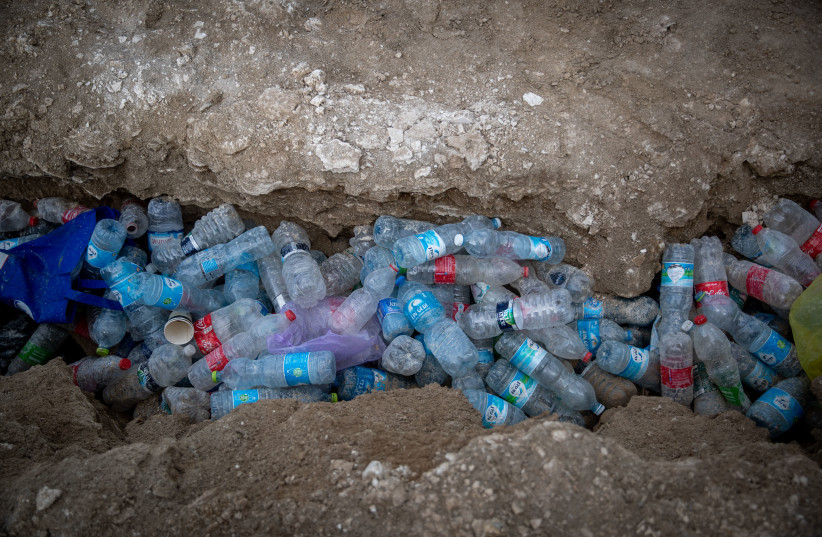The dives, which coincide with World Oceans Day on June 8, took place at Givat Aliya in Jaffa, on the beaches of Herzliya and on Dor-Nashsholim beach with 55 divers.
Published: JUNE 12, 2023

(photo credit: MINISTRY OF ENVIRONMENTAL PROTECTION)
The Environmental Protection Ministry is leading underwater cleaning dives in the Mediterranean Sea and the Red Sea as part of the “Clean Beach” program throughout the month of June.
The dives, which coincide with World Oceans Day on June 8, took place at Givat Aliya in Jaffa, on the beaches of Herzliya and on Dor-Nashsholim beach with 55 divers collecting about 120 kg of waste, mostly made of plastic, disposable food wrappers and drink cans. The next dives are slated for June 16 and June 23-24.
Environmental Protection Minister Idit Silman explained the program’s significance. “Every year, we support clean-up dives in the Mediterranean Sea and the Gulf of Eilat, to clean up the waste on the seabed and raise awareness for keeping the beaches clean, as part of the Clean Beach program,” Silman said.
“The first findings from the series of dives held this weekend show once again what we all already understand: The plastic waste that the public brings to the beaches pollutes not only the beaches but the sea itself. We invite the divers to join us in the additional cleaning dives this month, and call on the public to continue to keep the beaches and the sea clean.”
The dives were conducted under the leadership of the “Sea Guard” of the Israel Diving Association in cooperation with the Nature and Parks Authority. The waste was removed and looked through. The ministry said data collected during the dives will be monitored and used to understand the sources of waste and find solutions to the environmental problem it causes in addition to increasing awareness.
2023 marks the 18th year the ministry has run the Clean Coast program.
View of Empty plastic bottles on the Dead Sea beach, on November 5, 2020. (credit: YONATAN SINDEL/FLASH90)
How big of a problem is microplastic waste on Israel’s beaches?
Israel’s coastline is contaminated with over two tons of microplastics that are dangerous to the environment and to health, an October study at Tel Aviv University showed.
The sources of plastic pollution found include food packaging, single-use plastic products and fishing nets. The most polluted Israeli beaches are in Tel Aviv and Hadera. The researchers warned that given the current situation in Israel, public exposure to microplastic waste is “inevitable.”
The Environmental Protection Ministry recently launched a public-service campaign urging people to bring multiple-use plates, cups and cutlery with them to the beach, nature reserves and parks and to take them home.
Judy Siegel-Itzkovich contributed to this report.
The sources of plastic pollution found include food packaging, single-use plastic products and fishing nets. The most polluted Israeli beaches are in Tel Aviv and Hadera. The researchers warned that given the current situation in Israel, public exposure to microplastic waste is “inevitable.”
The Environmental Protection Ministry recently launched a public-service campaign urging people to bring multiple-use plates, cups and cutlery with them to the beach, nature reserves and parks and to take them home.
Judy Siegel-Itzkovich contributed to this report.
https://www.jpost.com/environment-and-climate-change/article-746037

